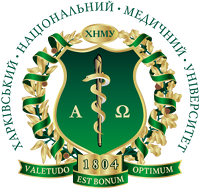Будь ласка, використовуйте цей ідентифікатор, щоб цитувати або посилатися на цей матеріал:
http://repo.knmu.edu.ua/handle/123456789/8947| Назва: | Blocks of the heart (AV blocks) |
| Автори: | Кочубєй, Оксана Анатоліївна Кочубей, Оксана Анатольевна Kochubiei, Oksana Ahmed, Sahban Rasheed |
| Теми: | heart AV blocks |
| Дата публікації: | бер-2015 |
| Видавництво: | KhNMU |
| Бібліографічний опис: | Ahmed Sahban Rasheed. Blocks of the heart (AV blocks) / Sahban Rasheed Ahmed, O. Kochubiei // Implementation of biethics principles in clinical practice : IV International scientific students`conference, dedicated to the 210th anniversary of KhNMU, 31 of March 2015 : abstract book. – Kharkiv : KhNMU, 2015. – P. 13–14. |
| Короткий огляд (реферат): | Heart block is an abnormal heart rhythm where the heart beats too slowly (bradycardia). In this condition, the electrical signals that tell the heart to contract are partially or totally blocked between the atria and the ventricles. These AV blocks are divided into 3 degrees. First-Degree Heart Block. In first-degree heart block, the heart's electrical signals are slowed as they move from the atria to the ventricles. This results in a longer, flatter line between the P and the R waves on the ECG. First-degree heart block may not cause any symptoms or require treatment. Second-Degree Heart Block. In this type of heart block, electrical signals between the atria and ventricles are slowed to a large degree. Some signals don't reach the ventricles. On an ECG, the pattern of QRS waves doesn't follow each P wave as it normally would. Second-degree heart block is divided into two types: Mobitz type I and Mobitz type II. Mobitz Type I This type (also known as Wenckebach's block). The PR intervals gets longer and longer until the QRS waves don't follow the next P wave. Mobitz Type II In second-degree Mobitz type II heart block, some of the electrical signals don't reach the ventricles. However, the pattern is less regular than it is in Mobitz type I. Some signals move between the atria and ventricles normally, while others are blocked. Third-Degree Heart Block(Complete heart block). In this type of heart block, none of the electrical signals reach the ventricles. When complete heart block occurs, special areas in the ventricles may create electrical signals to cause the ventricles to contract. This natural backup system is slower than the normal heart rate and isn't coordinated with the contraction of the atria. On an ECG, the normal pattern is disrupted. The P waves occur at a faster rate, and it isn't coordinated with the QRS waves. Management. Complete heart block can result in sudden cardiac arrest and death. This type of heart block often requires emergency treatment. A temporary pacemaker might be used to keep the heart beating until you get a long-term pacemaker. Patients treated with permanent pacing to treat AV blocks have an excellent prognosis. Patients with advanced AV blocks who are not treated with permanent pacing remain at high risk of sudden cardiac death. Although AV block generally is not associated with major morbidity, progressive degrees of AV block carry increasing morbidity and mortality. |
| URI (Уніфікований ідентифікатор ресурсу): | https://repo.knmu.edu.ua/handle/123456789/8947 |
| Розташовується у зібраннях: | Наукові роботи молодих вчених. Кафедра пропедевтики внутрішньої медицини № 1, основ біоетики та біобезпеки |
Файли цього матеріалу:
| Файл | Опис | Розмір | Формат | |
|---|---|---|---|---|
| Ahmed Sahban Rasheed PIM.docx | 14,38 kB | Microsoft Word XML | Переглянути/відкрити |
Усі матеріали в архіві електронних ресурсів захищені авторським правом, всі права збережені.

